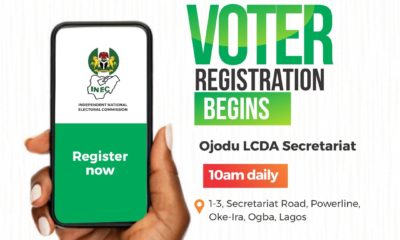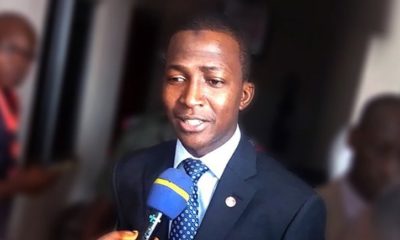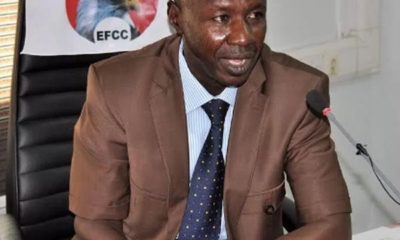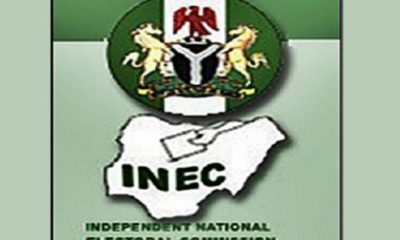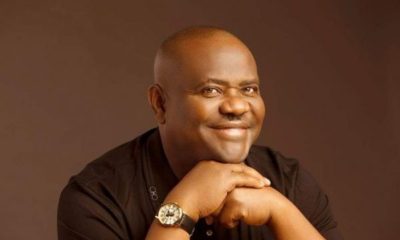News
INEC Engages EFCC, FIU In Tracking Campaign Funding

It is no longer business as usual for political parties and their candidates as the Independent National Electoral Commission (INEC) has kept a tab on their campaign funds. INEC specifically engaged the services of the Economic and Financial Crimes Commission (EFCC) and the Financial Investigation Unit (FIU) to track the campaign funds of all the parties and their candidates featuring in the 2019 general elections. The electoral umpire has also drafted the National Broadcasting Commission (NBC), the Nigeria Communication Commission (NCC), the Centre for Social Justice (CSJ), the Nigeria Police Force (NPF) and four other organisations to collaborate with the anti-graft agencies to do a thorough job. These revelations were made yesterday in Abuja during the inauguration of the Inter-agency Campaign Finance Monitoring Group by INEC national commissioner, Prof. Anthonia Okosi-Simbina. She said that the report of the 2019 campaign finances would be released immediately after the upcoming general elections. According to Okosi-Simbina,”we will check newspapers advert, TV, radio, billboards and we must see to the conclusion. Those who spent beyond what the legal framework provides for or spent outrageously will have themselves to blame.” The INEC chief declared that “vote-buying must be monitored too. And those reports must be published after the election. Unlike what happened in the past, six months will be too late for the report to be released. We will ensure compliance with the Electoral Act.” She said all the 10 groups engaged for the tracking of the campaign finances will be working with the electoral finance and party monitoring department of INEC. Similarly, INEC assistant director, Campaign Finance Tracking Unit, Ishaq Garba Aliyu, said that they recorded a milestone in the 2015 campaign finance tracking, adding that the commission would not leave anything to chances in 2019. “We have built the capacity of the staff members. They reviewed the tracking forms to include separate forms for candidates and political parties. The tracking ends on the day of the election,” Aliyu stated. No Politician Teleguiding Our Operations – INEC Meanwhile, INEC has dismissed the insinuations that its management led by Prof. Mahmood Yakubu was being teleguided by some politicians. INEC administrative secretary in Ekiti State, Dr. Muslim Omoleke, stated this yesterday in Ado Ekiti. He said that the commission under Yakubu is truly independent. Omoleke maintained that “no one controls INEC because we are empowered by laws to enjoy financial and administrative autonomy. It is no longer easy for them to control us.” He disclosed that 14 political parties in Ekiti State would participate in the National Assembly elections holding across the country on Saturday. Overall, 73 political parties are featuring in this year’s general elections. The INEC official assured the voters that the smart card readers would record zero failure during the polls, unlike what obtained in past elections, where commission’s personnel had to resort to incident forms for persons who fell victims of the malfunctioning machines. Omoleke added that politicians would be disappointed on Saturday if they rely on the strategy of vote-buying to win elections, saying the polling booths would be arranged in such a way that would counter such electoral heist. “We want to assure Nigerians that we will be fair to all parties. To us in INEC, no party is big or small, they are the same and it is with that spirit we are going to deal with them on the day of elections,” he said. On the issue of vote-buying, Omoleke said, “politicians won’t find it easy this time. We have mapped out our strategies and we are working closely with the security agencies to make perfect arrangements in our polling booths in such a way that no one can know where and who you actually voted for. “Apart from vote-buying, politicians also resort to ballot box snatching to win elections. This can no longer work because anywhere such an incident is recorded, the poll will be cancelled and repeated the second day. “Perpetrators of such have nothing to gain because they will automatically lose such votes to cancellation and if they are caught during ballot snatching or identified by security agencies, they will be prosecuted”, he warned. Votes Will Count, INEC Insists Also yesterday, INEC insisted that votes cast in the 2019 general elections would count. While receiving the Commonwealth Election Observer Team, INEC chairman (Yakubu) said that the off-season elections conducted by the commission were adjudged free and fair, adding that the commission would ensure that the conduct of the polls conforms with the international best practices. Yakubu said: “The elections on the 16th February and 2nd March, 2019, will be free, fair and credible. The votes will count,” stressing that INEC invited the Commonwealth to observe the election and not to monitor. He said: “I learn that the Commonwealth has deployed people to many states of the federation. The 32 recommendations the Commonwealth made after the 2015 general elections are being implemented administratively.” The INEC boss explained that recommendations which require the amendment of the constitution and the Electoral Act would be implemented when the laws are repealed. “The last recommendation of the Commonwealth Mission was accreditation and voting at the same time. The 2019 general elections will witness accreditation and voting simultaneously,” he said. Former President of Tanzania, Dr. Jakaya Kikwete, who led the delegation, said that they were in the country to observe and not to monitor the election. He said: “We want to know INEC preparedness on the election because we will be visiting many places. After the election, we will prepare a comprehensive report. We have already prepared a preliminary report on the election,” Kikwete said. DSS Warns Against Hate Speech, Fake News In another development, the Department of State Services (DSS) has warned Nigerians, especially politicians to desist from hate speech, fake news and other activities capable of causing trouble before, during and after the 2019 elections. The DSS, in a statement by its spokesman, Mr. Peter Afunanya, said that “the Service will not condone fake news, incendiary or hate speeches designed to whip up dangerous ethnic, religious and/or political sentiments capable of stoking the embers of violence. “Consequently, prospective lawbreakers are forewarned to steer clear of acts capable of undermining national security and stability. The Service will, however, not stand idly and watch miscreants and mischief makers bring avoidable chaos and disorder upon the nation,” Afunanya said. He said that “politicians and the youths are expected to shun all acts of violence the same way observers are urged to keep to the fundamentals and principles of election monitoring as allowed by law and global best practices. “Without doubt the Electoral Act is clear on the roles of stakeholders. The common aim of all and sundry should be for Nigeria to hold successful elections that will be adjudged free, fair, transparent and credible and accepted nationally and internationally. Everyone is urged to conduct his or herself properly before, during and after the elections and avoid actions that may cause the breakdown of law and order.” According to him, “the DSS will professionally discharge its statutory mandate which, among others, is to detect and prevent threats and crimes against the internal security of Nigeria. Also, it will appropriately engage stakeholders. This is for the protection and success of the elections. Therefore, ensuring security that will make the electoral process noble and acceptable to participants and their supporters is uppermost to the Service. In this regard, the Service is determined to identify and arrest criminals and their collaborators whose activities are counter to the national objective of achieving peaceful and orderly elections.” Court Asked To Disqualify Atiku From Presidential Poll And five days to the presidential election, a group, the Incorporated Trustees of Egalitarian Mission for Africa, has sued the presidential candidate of the Peoples Democratic Party (PDP), Alhaji Atiku Abubakar, over his claim of Nigerian citizenship. The suit marked FHC/ABJ/CS/177/2019 and dated February 11, 2019, was filed on behalf of the group by Mr. Kayode Ajulo. In the suit, the plaintiff wants an interpretation of section 25(1) and (2) and 131(a) of the Constitution of the Federal Republic of Nigeria, 1999, (as amended). Other defendants in the suit are the PDP, INEC, and the attorney-general of the federation and minister of justice. The group wants the court to determine, “whether section 25 of the 199 Constitution (as amended) is the sole authority that spells out ways by which a person can become a Nigerian citizen by birth? “Whether by the provisions of section 131(a) of the same constitution, only a Nigerian citizen by birth can contest for the office of the President of the Federal Republic of Nigeria? “Whether by the combined interpretation of sections 25(1) and (2) and 131(a) of the same constitution and giving the circumstances surrounding the birth of the 1st defendant, he can be cleared by the 2nd and 3rd defendants to contest for the office of the president of Nigeria?” If the answers to the aforesaid questions are resolved in favour of the plaintiff, consequently, the group prayed for the following reliefs: “A declaration that by the provisions of Section 131(a) of the Nigerian constitution, only a Nigerian citizen by birth can contest for the office of the president of the country. “A declaration that by the combined interpretation of sections 25(l) and (2) and 131(a) of the constitution and giving the circumstances surrounding the birth of the 1st defendant, he cannot be cleared by the 2nd and 3rd defendants to contest for the office of the president of Nigeria. In an affidavit deposed to by one Michael Okejimi, a legal practitioner in the law firm of Kayode Ajulo, he averred that Atiku was born on the 25th November, I946. “That from the 1st defendant’s own testimony that is gazetted and published in most national dailies in circulation, he is from Jada town in Adamawa State and Jada used to be in Ganye local government area in Adamawa State. “That Ganye is regarded as the mother of the whole Chamba tribe. “That Ganye, however, was never part of Nigeria legally as at the date of birth of the 1st defendant. “That the area had been entrusted to Britain by a League of Nations mandate in l919 and later as Trust Territory by the United Nations in l946. “That with the defeat of Germany in World War I, Cameroon became a League of Nations mandate territory and was split into French Cameroons and British Cameroons in 1919. “That while France integrated the economy of their part of Cameroon with that of France, the British administered theirs from neighbouring Nigeria, making 1st defendant’s Jada, a British franchise. “That a plebiscite was held in British Cameroons to determine whether the people preferred to stay in Cameroon or align with Nigeria. “That while Northern Cameroon preferred a union with Nigeria, Southern Cameroon chose alignment with the mother country. “That on June 1, I961, Northern Cameroon became part of Nigeria, and on October 1, 1961, the Southern territory dissolved into Cameroon. “That Ganye, which incorporates the 1st defendant’s birthplace of Jada was the headquarters of British Cameroons, but it joined Nigeria following the plebiscite. “That when the lst defendant was on November 25, I946 born to a Fulani trader and farmer Garba Abubakar, Jada village and other parts of Chamba land in the then Northern Cameroon were still known as British Cameroons. “That none of the lst defendant’s parents or grandparents was born in Nigeria. “That the Ist defendant’s father died a citizen of Northern Cameroon in I957 prior to the referendum of June 1, 1961, that made Northern Cameroon became part of Nigeria.”



